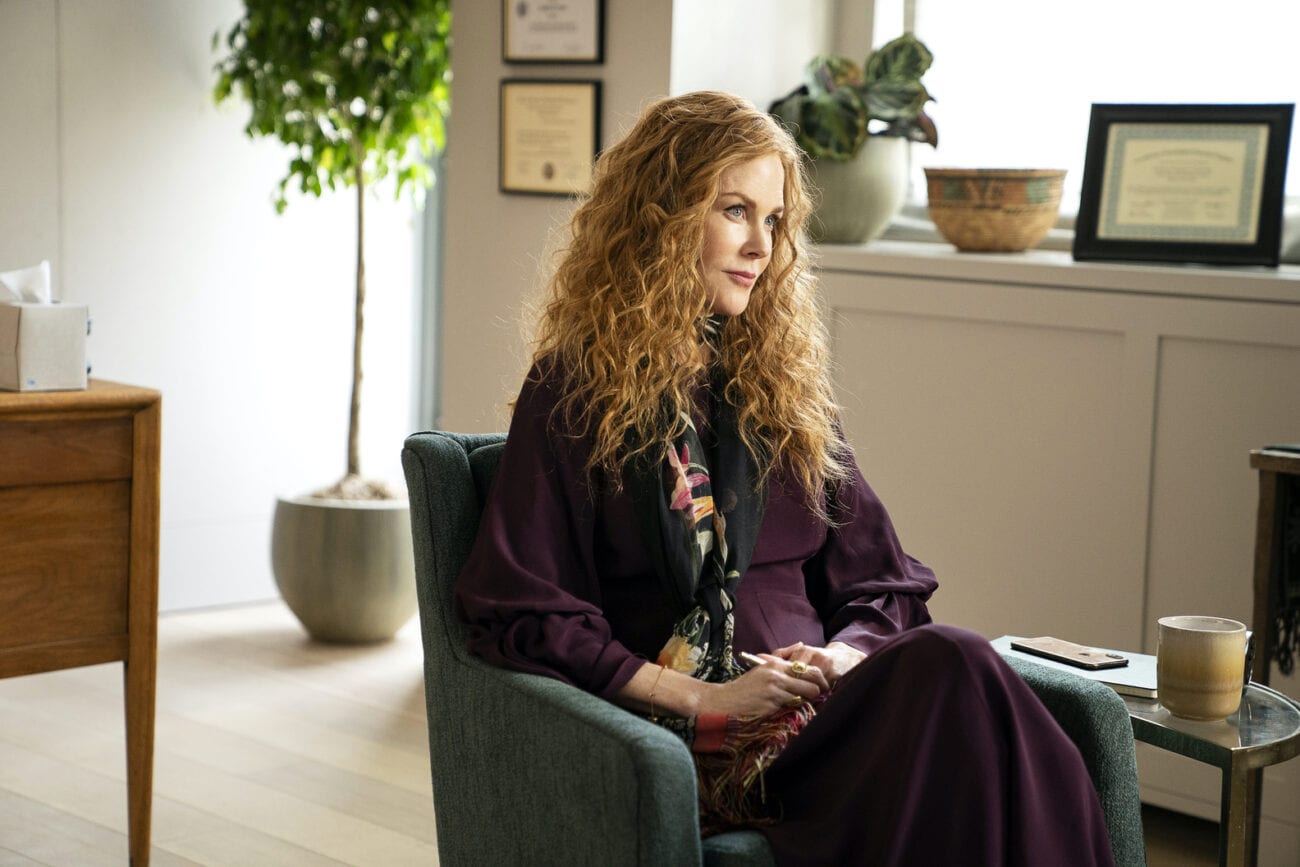From its opening frames, I couldn’t shake the feeling that The Undoing was taking place in a New York that no longer exists. Grace (Nicole Kidman) and Jonathan (Hugh Grant) get ready for the day in their Upper East Side apartment. Their son, Henry (Noah Jupe), makes a smoothie but doesn’t clean up after himself, as his parents share a playful repartee about an upcoming fundraiser for his school. Everything feels not quite happy, but…normal.
Of course, we are tipped off by the very title of The Undoing that things are going to be, well, undone. So while for me this sense of viewing a life that no longer exists stems from the impact of COVID-19 and the ensuing lockdown on New York City, the audience is primed for things to unravel in narrative terms from the get-go.
They don’t quite do so in Episode 1 (also titled “The Undoing”), or only just begin to as the hour nears its end. There is a murder, sure, but it doesn’t occur until after a substantial amount of time has passed. And Grace’s reaction is the polar opposite of Deputy Andy’s in Twin Peaks—she hardly seems to realize the cops have come to see her because Elena has been killed. And this makes sense because her life has always already been a veneer; she’s all too used to playing on the surface without even thinking about what may be beneath it. Perhaps there is nothing.

Perhaps others view it differently, but through a decade and a half living in New York City, I’ve never viewed the Upper East Side as anything but a place full of boring rich people. I briefly dated a woman who lived there—not a rich person but a young one living in one of those small boring apartments that somehow find space amongst the more luxurious spaces like the Fraser apartment. But still, it didn’t feel like a place to go where anything fun was happening.
Raise kids, get them into a private school or hire them a private tutor (or both), attend fundraisers and galas. Perhaps take a jog in the park. This is the life that The Undoing presents, which I previously referred to as a veneer. It at least seems to me that everything is on the surface, with a concern for propriety and status trumping any zest for living. And thus it is no surprise that Elena lives in Harlem, in contrast, with the very geography of the city serving as a metaphor for the threat she presumably represented to all of this.
The Undoing is clearly a story of its time and place, with shots of Central Park scored by rousing Vivaldi violins providing its intermezzos to reinforce the vibe of Upper-East-Side-ish-ness that pervades its frames. This is the New York of the wealthy, or at least the well-to-do, who do not necessarily view themselves as such. They may struggle to get by and to raise their children. They may struggle with all sorts of problems that life throws them, which are not to be diminished. But they will turn around and bid thousands of dollars on a glass of water—it’s for a good cause.
That cause seems to be to provide scholarships to the exclusive private school to which they send their children. But do they care about providing educational opportunities to those who are less fortunate yet deserving, or do they care about diversity for the sake of their image? How much of a dark underbelly does the casting of Donald Sutherland portend?
Miguel (Edan Alexander) would seem to be a scholarship kid (though Episode 1 “The Undoing” does not establish this definitively). His mother Elena (Matilda De Angelis) joins the group of women planning the fundraiser, and it must be said that she behaves a bit oddly. But I can’t help but wonder how much of the feeling of unease that pervades the breastfeeding scene is a matter of how this is being presented from the point of view of the other women around the table. They are thrown off by the act—even Grace, though she is indeed the nicest among them—and so The Undoing puts us off our footing as well, bringing forth the tension between this most natural of occurrences and its setting. Elena doesn’t do anything wrong per se, she simply does something that is…not done.
The same goes when Elena (fully nude) talks with Grace in the locker room. Her ease in her own body puts Grace off-kilter, even if again she knows that she perhaps should not be. And then at the fundraiser, when she encounters Elena and her sadness in the bathroom—these are all too human moments, and it is as if Grace can’t quite connect to them even as she does not push them away.
We know we are watching a mystery from the very way The Undoing presents itself. There is of course the large mystery of the murder, but I find myself more compelled by the smaller mysteries that fill the hour—why was Elena crying at the fundraiser, for example?
At one moment, late in the episode, we see more of the exchange between Grace and Elena in the locker room. Is this merely Grace remembering, or is it perhaps a clue that throughout this first episode The Undoing has been sticking solely to Grace’s perspective and how that filters and colors events?
It could be both, but this question comes to the fore as “The Undoing” ends with Grace finding Jonathan’s phone in their bedside drawer. How could he have left for his trip without it? Is this just a matter of absent-mindedness in preparing for an early flight after a long night tending to a child dying of cancer, or is there perhaps something else going on? Could he have been lying? Could it have been that Elena was looking at him at the party, and not Grace, and that she ended up crying in the bathroom alone because he was ignoring her? Are these the thoughts that are going through Grace’s mind as the episode cuts to black with a reprise of Vivaldi’s The Four Seasons?

The Undoing is based on a book (which I have not read, if you’re wondering) by Jean Hanff Korelitz called You Should Have Known. If the title of the miniseries wasn’t enough to get your speculative mind going in a certain direction, that of the book surely should be.
But of course we know we are watching a TV show, and we know that bad things are going to happen. There have been enough murder mysteries and dead girls over the years that one cannot help but wonder what makes this one different. I suppose I, too, am in a way the antithesis to our friend Deputy Andy Brennan, because I’m left at the end of Episode 1 wondering what makes this one worth thinking about. Perhaps we’ll find out next week.

